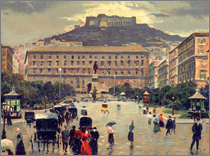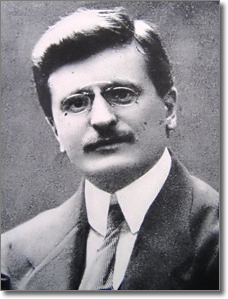
- palace San Giacomo and piazza del Municipio, postcard XX century
On October 28th 1918, the Mayor, professor Enrico Presutti, resigns, a renounciation resulting from the split recorded in the majority on the public trasport question. Few days later, the news of the end of the First World War puts in second level the election of the new Major. The communal Council's convocation is postponed on November 12th.
The delay was provvidential for the majority coalition, taken up to find a solution to the inegilbility of Arturo Labriola, the candidate with widespread success. The knotty problem to solve was the incompatibility, sanctioned by law, between the position of parliamentarian and the commission of Mayor.
Degree in law, lawyer, economist, free teacher of political economy at the University, reporter, syndacalist, Arturo Labriola in 1890, only seventeen years old, organized for the fitst time in Naples a demostration of the May Day. Stood for the list of idipendent Socialists, he was elected at the second turn winning a seat in Parliament of Regno d'Italia; this politial goal runned the risk of losing the project of his election to Mayor of Naples.
